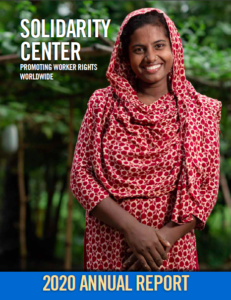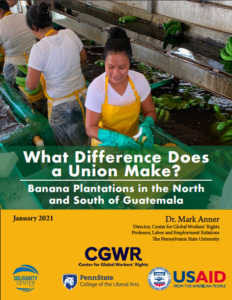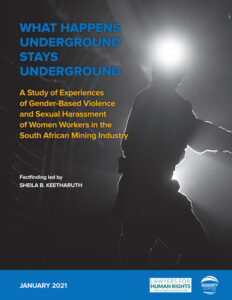 |
 |
 |
Solidarity Center’s Neha Misra said, “Before U.S. law said that we would tolerate forced labor if we really wanted a product for domestic consumption. Now, we are saying that we will not tolerate forced labor for any reason. This is a major step forward,” in response to an announcement that federal officials are preparing to enforce an 86-year-old ban on importing goods made by children or slaves under new provisions of a law signed by President Barack Obama.
Solidarity Center and other migrant labor organizations are calling on the South African government to urgently intervene and stop severe labor rights abuses faced by thousands of migrants working in the country’s farms. “The laws are there. The biggest challenge around most of this is just inability to enforce what exist on the books,” said Peter Hardie, SolidarityCenter South Africa program director.
A 2008 report from the U.S. labor rights group the Solidarity Center found child labor, debt bondage and wage theft on both Thai and Bangladeshi shrimp farms.
Solidarity Center Program Officer Nhlanhla Mabizela’s work on gender equality in South Africa is highlighted as part of a look back at the United Nation’s 16 Days of Activism against Gender-Based Violence. “Each time when I am part of a conversation about gender inequality, I leave with renewed hope and validation that I am part of a greater cause of realizing equal treatment of all genders,” Mabizela says.
Trafficked oil workers won a legal battle against Signal International, which falsely promised hundreds of Indian men secure jobs and permanent residency in the United States but instead were met with lost wages and poor working and living conditions. After a years-long lawsuit–the result of a mobilized group of workers, observant and concerned community members, engaged advocacy groups and, ultimately, an unprecedented collaboration between the Southern Poverty Law Center (SLPC) and other for-profit law firms across the country–Signal filed for Chapter 11 bankruptcy protection to implement a $20 million settlement with more than 200 workers. “It took years,” says Neha Misra, senior specialist for migration and human trafficking with Solidarity Center. “And a lot of money.”
“Factory workers [in Burma] want better jobs, higher wages and the freedom to organize,” said Solidarity Center Director of Asia Programs Tim Ryan. And while they are hopeful for the possibilities that foreign companies and new investment can bring, they also want their new government to ensure that companies will stop trying to destroy their unions and “game the system” around the new national minimum wage approved shortly before the election.
An article originally posted by Food Tank, which includes the Solidarity Center in its list of organizations working on health, safety, and worker rights in the global food industry, has been picked up by the Huffington Post.
Ultimately, the path to ending the forced labor, trafficking and other abuses of migrant workers in Malaysia demands the adoption and aggressive enforcement of all ILO core labor standards, such as freedom of association, the right to collective bargaining and an end to practices such as debt bondage. It’s extremely important that the world is now focused on the plight of these exploited migrant workers, but it’s equally important to recognize that these abuses exist because of the broader environment of labor injustice for all workers of Malaysia.
Murder is a constant threat for workers who organize unions in Guatemala. Since 2007, more than 70 labor activists have been killed, according to the nonprofit Solidarity Center, which is affiliated with the AFL-CIO. Kidnappings, break-ins and death threats are fairly common as well. Republished by MSN News: “Guatemala And The Failure Of Free Trade,” November 6, 2015
Neha Misra, Solidarity Center senior specialist for migration and human trafficking, said temporary work visa programs can be “a way for governments to address the desire for cheap labor, malleable labor,” through a system “devoid of workers’ rights.”
Re-posted: Yahoo News, “Modern Slavery: Labor Trafficking is Everywhere and Nowhere,” October 26, 2015